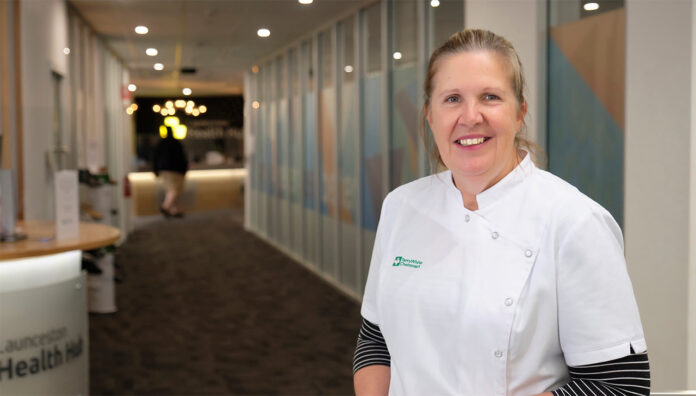Tasmanian pharmacist Christine White MPS has embraced immunisation in pharmacy, despite her own early hesitancy, and now considers the benefits ‘immense’.
How did you start out in pharmacy?
After a year studying medicine, I began the University of Tasmania pharmacy course in 1982 (only 12 students so individualised learning’!). It fitted with my goal of making a difference in the health of the community. When my final year research project on tobacco advertising and rates of adolescent smoking was published in several journals, I realised pharmacy is more than dispensing tablets, but a career of many facets.
Is pharmacist immunisation valuable?
Pharmacy is ever evolving and it’s important to keep knowledge and practices current. In 2001 I became an Accredited Pharmacist – one of the most rewarding parts of my career. I undertook vaccination training as soon as it was available in Tasmania about 3 years ago, although hesitant about my ability and the value of pharmacist immunisers. But the benefits are immense in protecting the community. My first experience was very encouraging – no one was in pain, fainted or had an anaphylactic reaction.
I own and work in a pharmacy in a medical centre (open 7 days and until 9 pm on week days) and every day we vaccinate against pertussis and influenza. Doctors in the centre are also more than happy to refer patients to us for flu, meningococcal and now DPT (Boostrix). And pregnant women vaccinated by their doctors, bring the baby’s father and grandparents to the pharmacy to be vaccinated with DPT also. A recent PSA immunisation workshop in Hobart gave us valuable techniques to cope with vaccine hesitancy, especially with COVID-19.
‘My first [immuniser] experience was very encouraging – no one was in pain, fainted or had an anaphylactic reaction.’
How do you practice medicine safety?
I have owned four pharmacies during my 35-year career, two in medical centres, one a suburban pharmacy and one in rural Tasmania. Each one has different challenges and experiences, and health professionals in a rural community must be very adaptable. On the east coast in my Swansea pharmacy, I made up 40-litre drums of football liniment for the local team, and mixture to stop lambs scouring, as well as the regular pharmacy offerings!
At times there were no doctors, and during one 3-week period one GP did not have the skill set to work in a small rural community. Something was clearly amiss when flucloxacillin was prescribed for every infection, the same dose for adults and children. I did offer my copy of Antibiotic Guidelines! That highlighted pharmacist’s role in protecting patients from inappropriate prescribing and prescribing errors.
What effect did the COVID-19 pandemic have on your working life?
Even with low figures here, the effect has been significant. Workload increased substantially and drug supply difficulties added to our frustration initially. Temperature checks and exclusions of people with cold and flu symptoms continues. Our ‘driveway service’ for which patients ring after leaving the respiratory centre for prescription collection and medicine is delivered to cars in PPE gear, has extended to all cars and is popular with young parents with a carload of children.
One consumer last year, frustrated at my not giving him medicines without a prescription (or any money), verbally abused me and headbutted my newly installed screen, breaking it. I was furious! Afterwards the local newspaper published a story about pharmacists under pressure in the pandemic. All health professionals have been under pressure and we’ve had to change operations, hours or work, physical setups and had supply issues with medicines, masks, hand sanitiser and toilet paper! While the government has not always recognised the integral part we play, the community has appreciated pharmacists delivering services in a professional and timely manner.
How is your work and family balance?
I returned to work quite soon after each of my four children were born (I now have three grandchildren) and was extremely lucky I had support networks and workplaces that allowed me to breastfeed them well into their second year. When my last child was born 4 weeks early in Swansea, the local childcare centre would take children for walks and drop my daughter off for a feed every day. Consumers soon became disappointed if they missed their cuddle in the pharmacy.
What’s next?
I will be transitioning out of the ‘front line’ for a much-needed holiday break, but only temporarily. I hope to mentor new graduates and emulate the wonderful role models I had throughout my pharmacy career.






 ‘We’re increasingly seeing incidents where alert fatigue has been identified as a contributing factor. It’s not that there wasn’t an alert in place, but that it was lost among the other alerts the clinician saw,’ Prof Baysari says.
‘We’re increasingly seeing incidents where alert fatigue has been identified as a contributing factor. It’s not that there wasn’t an alert in place, but that it was lost among the other alerts the clinician saw,’ Prof Baysari says.








